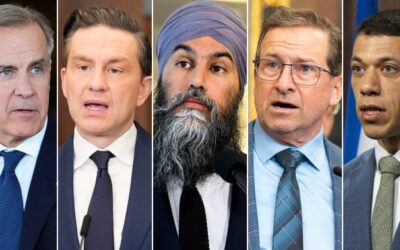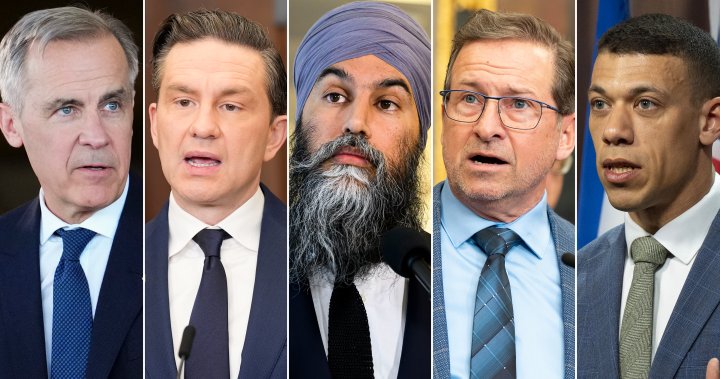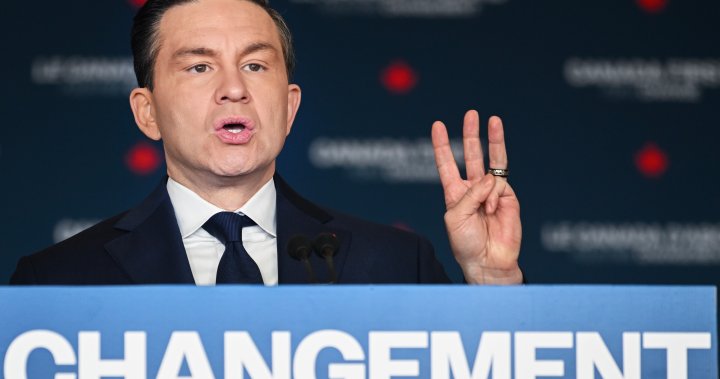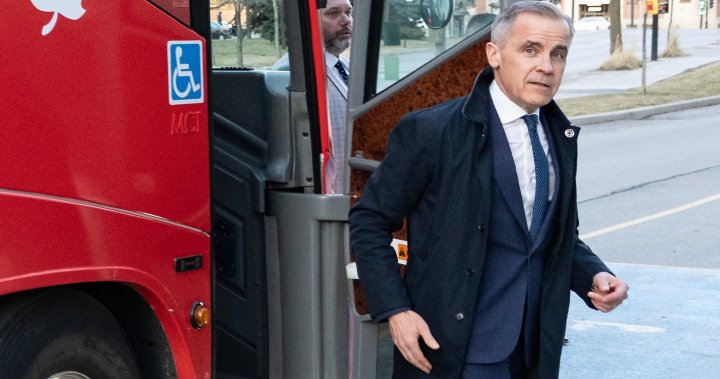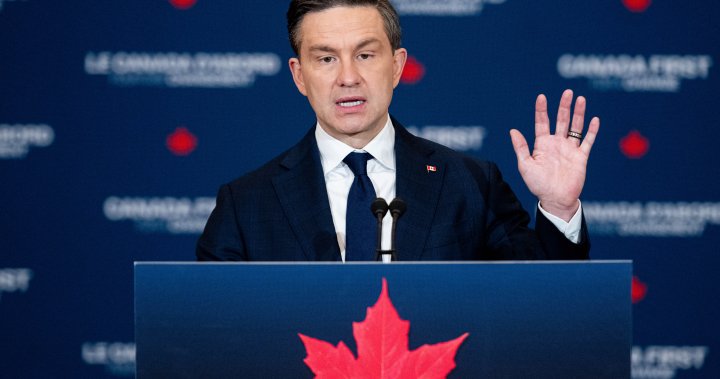Liberals lead dips for 1st time in Canada election as Tories gain: poll – National
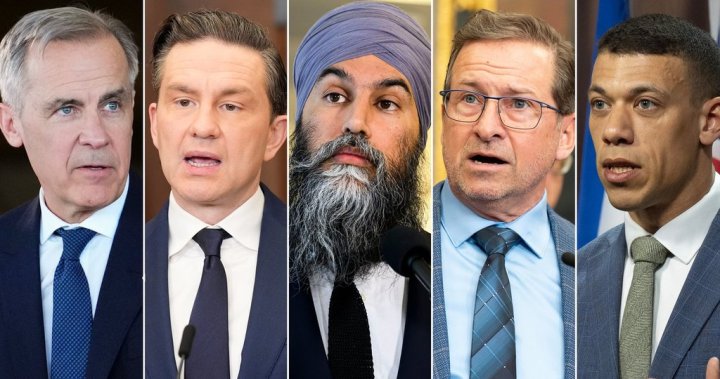
The Liberals continue to lead the federal election race at the halfway point of the campaign, a new poll suggests, but the Conservatives have narrowed the gap.
The latest Ipsos poll exclusively for Global News shows 42 per cent of Canadians surveyed would vote for the Liberals, down four points from last week and the first time since the election began that the party has lost ground. The Conservatives are up two points at 36 per cent.
“Whatever momentum the Liberals have had has declined,” said Darrell Bricker, CEO of Ipsos Public Affairs.
“It’s been the only good news that the Conservatives have had since Mark Carney became the leader of the Liberal Party. … Whether it will hold up or not is another question.”
Eleven per cent of decided voters surveyed said they would back the New Democrats, down one point from last week. The Green Party also fell one point, to two per cent, while the Bloc Quebecois stayed steady at six per cent support nationally, or 25 per cent of Quebec voters.
The share of Canadians who are undecided has gone up four points since last week, to 11 per cent, according to the poll, which comes ahead of this week’s leaders debates in Montreal.
Liberal Leader Mark Carney is favoured to win the English-language debate, with 41 per cent saying so, while 34 per cent say Conservative Leader Pierre Poilievre will win the French-language debate.

After three weeks of campaigning, 33 per cent of Canadians said they are more likely to vote for the Liberals since the campaign began, compared to 25 per cent who said the same for the Conservatives.
Conversely, 33 per cent said they are now less likely to vote for the Conservatives than they were three weeks ago, while 27 per cent are turning away from the Liberals.
Just nine per cent of voters surveyed said they were more likely to choose the NDP, versus 32 per cent who are now less likely.

Get daily National news
Get the day’s top news, political, economic, and current affairs headlines, delivered to your inbox once a day.
“The NDP is going to have a very difficult time hanging onto its official party status if these numbers hold up,” Bricker said.
“People who think that the country isn’t working for them tend to be voting for Pierre Poilievre and the Conservatives, because they see them as the only (vote for) change on the ballot.”
The share of people looking for change in leadership has increased since last week, by three points, with 56 per cent saying it’s time for a new leader to take over compared to 44 per cent who say the Liberals deserve re-election.
When asked which party leader would make the best prime minister, Canadians are still choosing Carney over Poilievre.
However, Carney’s support has fallen four points since last week, to 41 per cent, while Poilievre has gained four points and sits at 36 per cent support. NDP Leader Jagmeet Singh has held steady at 12 per cent.
Poilievre also appears to be gaining momentum on questions about which leader will best handle U.S. President Donald Trump and protecting Canada from tariffs and other protectionist trade policies.
Although close to half of voters surveyed still see Carney as the toughest negotiator among party leaders in future talks with Trump — as well as the one who would best unite Canadians on pivoting the economy away from the U.S. and “has the skills” to address economic hardship from Trump’s tariffs — Poilievre has improved his support on those questions by between two and six points since last week.
Notably, while 42 per cent said Poilievre would “roll over and accept whatever President Trump demands” from Canada on trade and security, the number of Canadians who said the same about Carney has risen five points, to 27 per cent.

Carney, who is serving as prime minister in a caretaker capacity during the campaign, said after a call with Trump last month that the two leaders agreed the U.S. and Canada would hold “comprehensive negotiations” on the bilateral relationship after Canadians elect a new government.
Asked by Ipsos what the next government should do to help Canadians impacted by Trump’s tariffs, 46 per cent said they want lower income taxes, followed by 41 per cent who said they want affordability issues addressed. Close to 30 per cent backed a temporary break from the GST or HST, while small business tax relief, company subsidies for new jobs, lower corporate taxes and homebuyer supports received smaller shares of support.
Affordability and the cost of living remains the top issue in the campaign three weeks in, Ipsos found, but the number of Canadians saying so has risen five points from two weeks ago, to 41 per cent.
While that earlier poll found U.S.-Canada relations was the number two issue, it has since dropped behind the economy, health care and housing. The number of Canadians who chose it as a top issue fell six points to 24 per cent.
Conservatives are now narrowly seen as the party that will best handle affordability, after tying with the Liberals last week. Meanwhile, the Liberals now lead the Conservatives as the best party to address U.S. relations in the eyes of Canadians by 62 points.
Bricker said this evolution could explain what’s driving Conservatives’ newfound momentum.
“If this election is about dealing with Trump and tariffs, Liberals are in a really strong position,” he said.
“If it’s about dealing with affordability, Conservatives are more competitive.”
These are some of the findings of an Ipsos poll conducted between April 8th and 10th, 2025, on behalf of Global News. For this survey, a sample of n=1,000 Canadians aged 18+ was interviewed online, via the Ipsos I-Say panel and non-panel sources, and respondents earn a nominal incentive for their participation. Quotas and weighting were employed to balance demographics to ensure that the sample’s composition reflects that of the adult population according to Census data and to provide results intended to approximate the sample universe. The precision of Ipsos polls which include non-probability sampling is measured using a credibility interval. In this case, the poll is accurate to within ± 3.8 percentage points, 19 times out of 20, had all Canadians been polled. The credibility interval will be wider among subsets of the population. All sample surveys and polls may be subject to other sources of error, including, but not limited to coverage error, and measurement error. Ipsos abides by the disclosure standards established by the CRIC, found here: https://canadianresearchinsightscouncil.ca/standards/
© 2025 Global News, a division of Corus Entertainment Inc.

